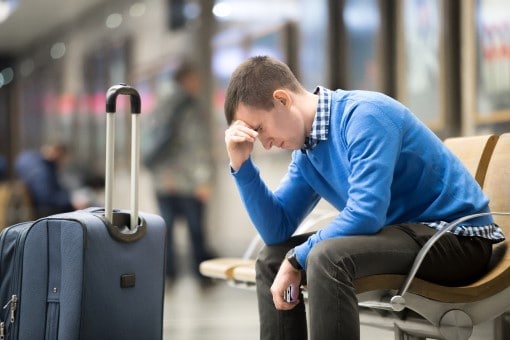
Can acupressure and acupuncture really help jet lag? – Here’s what we know and what you can try
By Jason Wooden, PhD | November 22, 2019
With more people traveling by air than ever before, there’s growing interest in natural remedies for jet lag such as acupressure and acupuncture. Sleeping pills are convenient, but they can leave you feeling too drowsy to function the next day.
Acupressure and acupuncture have been shown in studies to help relieve insomnia and pain, and acupressure may help reset the body’s clock to local time. Some acupressure techniques can be done on your own while acupuncture should only be done by a professional.
Why people are curious about acupressure and acupuncture for jet lag
It’s been said that travel is a curse.
Feeling out of whack for days after you reach your final destination can be grueling, whether you’re traveling for business or for pleasure.
With so many people on the move, there’s growing interest in natural remedies for jet lag, including ancient practices like acupressure and acupuncture.
Jet lag occurs when you travel across time zones and your body’s biological clock is not in sync with local time. Flying through three or more different time zones can upset the body’s 24-hour circadian rhythms.
And, the more time zones you pass through, the worse the jet lag can be.
It’s also worse if you’re traveling east because you lose time or with age since older people don’t recover as quickly.
For many, it may take days for their circadian rhythms to adjust to the new time zone.
Meanwhile, your body is telling you to sleep during the day and stay awake during the night.
Besides feeling tired and disoriented, you may also experience stomach problems, changes in mood, and have a hard time functioning.
Sounds familiar?
In 2017, over 4 billion passengers flew on airlines. With numbers like that, there are bound to be loads of travelers fighting jet lag on any given day.
Sleeping pills are a convenient remedy, but do come with potential downsides including headaches, dizziness, confusion, and feeling too drowsy to function the next day.
So, it’s understandable travelers are so interested in more tricks to fight jet lag, preferably without popping a pill.
The more options you have in your first aid kit for jet lag the better, right?
Can acupressure and acupuncture really work for jet lag?
Let’s take an honest look at what we know and what you can do.
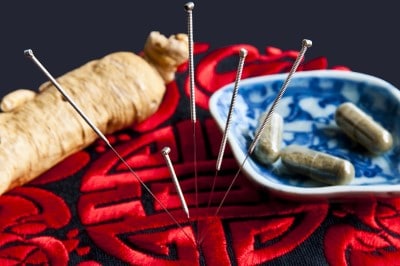
Acupressure or acupuncture, what’s the difference?
Before we get to how they may be used for jet lag, let’s be clear on the differences between acupressure and acupuncture.
Both are derived from traditional Chinese medicine, developed over a period of more than 2000 years. They are used for pain, headaches, stress, and various other conditions.
They work by stimulating specific points on the body.
Acupuncture does it by inserting thin needles through the skin at specific points.
Acupressure has been described as acupuncture without needles. It’s non-invasive, using firm pressure and massage at points on the body.
Acupuncture should be done by well-trained professional, as there are serious side effects if done incorrectly.
Acupressure is commonly done by a professional, but some techniques can be taught so you can do them by yourself at home…or on a trip.
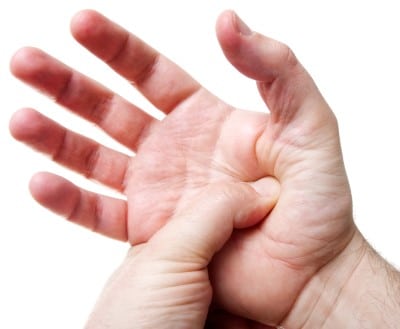
Acupressure for jet lag
Is there any evidence acupressure can be useful for jet lag?
For starters, in a meta-analysis of thirteen clinical trials, acupressure was shown to help people fall asleep more quickly and to sleep longer. Treatments involved applying pressure to three to seven points over a period of three to four weeks.
A recent study suggest self-administered acupressure may be helpful for insomnia. The subjects were taught how to apply daily acupressure on themselves in a training course.
So, acupressure from a professional or on your own may help you fall asleep once you reach your new time zone.
Some people are using it more directly to fight jet lag. The Uplift phone app, inspired by Dr. Charles Krebs, is designed to help you use acupressure to reset the body’s internal clock and ease the effects of jet lag.
It involves simultaneously pressing two pressure points on the left side of the body for one minute and repeating on the right side. So far, they say they’re seeing a 92 percent success rate in early tests with volunteers.
More:
Acupuncture benefits and risks
5 pressure points you can try 15 minutes before going to bed
Uplift Phone App: iPhone android
Prevent Jet Lag with Acupressure, Alicia White (available online)
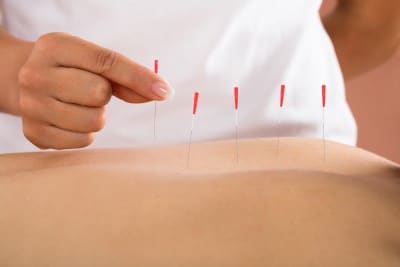
Acupuncture for jet lag
Is there any evidence that acupuncture can help with jet lag?
Unfortunately, it’s effect on jet lag hasn’t been directly studied
However, there is evidence from a number of clinical studies that acupuncture can help with insomnia.
More recently, in a clinical study involving 72 patients with insomnia, acupuncture was given three times a week for four weeks. Patients given acupuncture had better sleep quality at the end of the treatment.
More research needs to be done to tease out how it could more directly help with jet lag, such as resetting the body’s clock to the new time zone.
Meanwhile, research suggests it can help frequent travelers sleep better and manage other travel symptoms such as back pain.
Obviously, acupuncture is not as convenient as acupressure since it’s not something you can do on your own during your trip. You would need to pre-schedule an acupuncturist for when you reach your final destination.
If you’re interested in adding acupuncture to your jet lag first aid kit, be sure to work with a licensed and experienced practitioner.
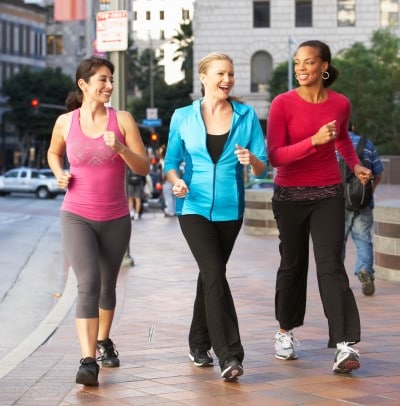
Other natural remedies for jet lag
In your quest for jet lag relief, don’t limit yourself to acupressure and acupuncture.
There are other natural remedies worth trying which can help with your battle against jet lag.
Again, the more options you have in your first aid kit the better, right?
And, there are basic things you should definitely be doing such as sleep hygiene. (This is what you do during the day, at bedtime, and during the night that can set the stage for quality sleep.)
For better sleep hygiene:
- Keep regular wake up and sleep times
- Avoid naps
- Exercise during the day
- Avoid large meals, alcohol, or stimulants such as caffeine before bedtime
- Give yourself some time to wind down
- Keep your sleep environment quiet, dark, and cool
Depending on where you’re staying, you may need earplugs to block out neighborhood noises. You can try a face mask if you’re dealing with excessive nighttime lighting.
Here are some of the natural jet lag remedies you may want to add to your first aid kit:
1) Melatonin
Melatonin is a hormone produced by the body that helps control your sleep-wake cycles. It rises in the night and falls in the morning.
Research suggests that melatonin supplements may help with jet lag. Melatonin supplements have become popular as a way to help the body adjust its clock to the new time zone.
Be sure to consult a doctor about the best strategy to use it and whether it’s right for you.
2) Light therapy
Here’s something pretty easy to do when you reach your destination. Go outside and get natural light. Open up the windows and flood the room with daylight.
Sunlight is a powerful tool to help the body adjust its circadian rhythm to a new time zone. Natural daylight has been shown in studies to promote sleep.
You can also try out a high tech alternative, light therapy glasses, to reset your clock to a new time zone. They emit blue wavelength light which mimics sunlight without damaging the eye and signals the body to suppress melatonin.
Learn more:
Sleep Drive and Your Body Clock (National Sleep Foundation)
Light and the circadian rhythm: The key to a good night’s sleep? (BBC)
How Light Therapy Glasses Improve Sleep and Mood
3) Physical activity
Physical activity has long been known to promote quality sleep. Recent research suggests that moderate exercise may be useful to more directly fight jet lag.
Depending when you exercise, you can either delay or move up the body clock. Exercising outside will also give your more sunlight exposure.
4) Homeopathic remedies
Online you can find a variety of over the counter homeopathic supplements designed to fight jet lag. They contain various natural supplements.
Keep in mind most have not been tested in clinical studies, but they may help with jet lag symptoms. To be sure, you can check with a complementary health specialist (i.e., naturopathic physician, alternative medicine practitioner).
Learn more:
Homeopathic Remedies (Verywell)
Clinically tested natural sleep aids
If you’re dealing with severe jet lag, be sure to check with your doctor. You could also be dealing with an underlying sleep disorder such as sleep apnea or other health issues that make it harder to get your sleep cycles back on track.
Jet Lag Travel Tips
Before Travel:
- Exercise, eat healthy, and get plenty of rest
- Before you leave, start going to bed an hour or two later (if traveling west) or earlier (if traveling east)
- Break up a long trip with a stop in the middle
During Travel:
- Change your watch to the destination time zone
- Avoid large meals, alcohol, and caffeine
- Hydrate
- Get up and walk around periodically
After You Arrive:
- Stay up until 10P local time
- Eat meals at the appropriate time
- Spend time in the sun
- Hydrate
- Avoid heavy meals, excess alcohol, and caffeine
- If sleepy, take short naps (20-30 minutes)
Sources: CDC, National Sleep Foundation
Useful acupressure, acupuncture, and jet lag links
What to remember about acupressure, acupuncture, and jet lag
- Acupressure and acupuncture can help with jet lag symptoms
- Acupressure may help reset the body’s clock to local time
- Acupuncture requires an experienced practitioner, acupressure can be done on your own
- Other natural remedies may help including sleep hygiene
- Check with a doctor for severe jet lag
Sources:
1. “Jet lag disorder”, MedlinePlus website
2. Jet Lag: Current and Potential Therapies, P T. 2011;36(4):221-31.
3. “Overcoming Jet Lag”, Cleveland Clinic website
4. “Traveler Numbers Reach New Heights”, 2018, International Air Transport Association website
5. “Acupuncture: In Depth”, NIH website
6. “Acupuncture”, John Hopkins Medicine website
7. Acupressure effect on sleep quality: A systematic review and meta-analysis., Sleep Med Rev. 2018 Feb;37:24-34.
8. Self-administered acupressure for insomnia disorder: a pilot randomized controlled trial., J Sleep Res. 2018 Apr;27(2):220-231.
9. “Uplift app says it can deliver a natural remedy to jet lag”, 2018, Boston Globe website
10. Acupuncture for Treatment of Insomnia: A Systematic Review of Randomized Controlled Trials, J Altern Complement Med. 2009 Nov;15(11):1171-86.
11. Efficacy and safety of acupuncture treatment on primary insomnia: a randomized controlled trial,
12. “Melatonin: What You Need To Know”, NIH website
13. Effects of light on human circadian rhythms, sleep and mood. Somnologie (Berl). 2019 Sep;23(3):147-156.
14. “Exercise Can Shift Body Clock, Possibly Countering Jet Lag and Other Circadian Disorders”,2019, Sleep Review website
Connect with us:
About Us
Better Sleep Simplified® was founded as a place for you to get clear and well-researched information.
Our goal is to make sure you know about your options so that you take action sooner rather than later.
Check us out on YouTube:
Watch and Learn
Helpful sleep tips, interesting sleep facts and statistics you want to know about
Affiliate Disclosure
This site is a participant in the Amazon Services LLC Associates Program and other affiliate advertising programs designed to provide a means for sites to earn advertising fees by advertising and linking to them.
Important: BetterSleepSimplified.com is for informational purposes only and is not intended or implied to be a substitute for professional medical advice, diagnosis, or treatment. Always consult a physician for sleep and health concerns. See additional information.
